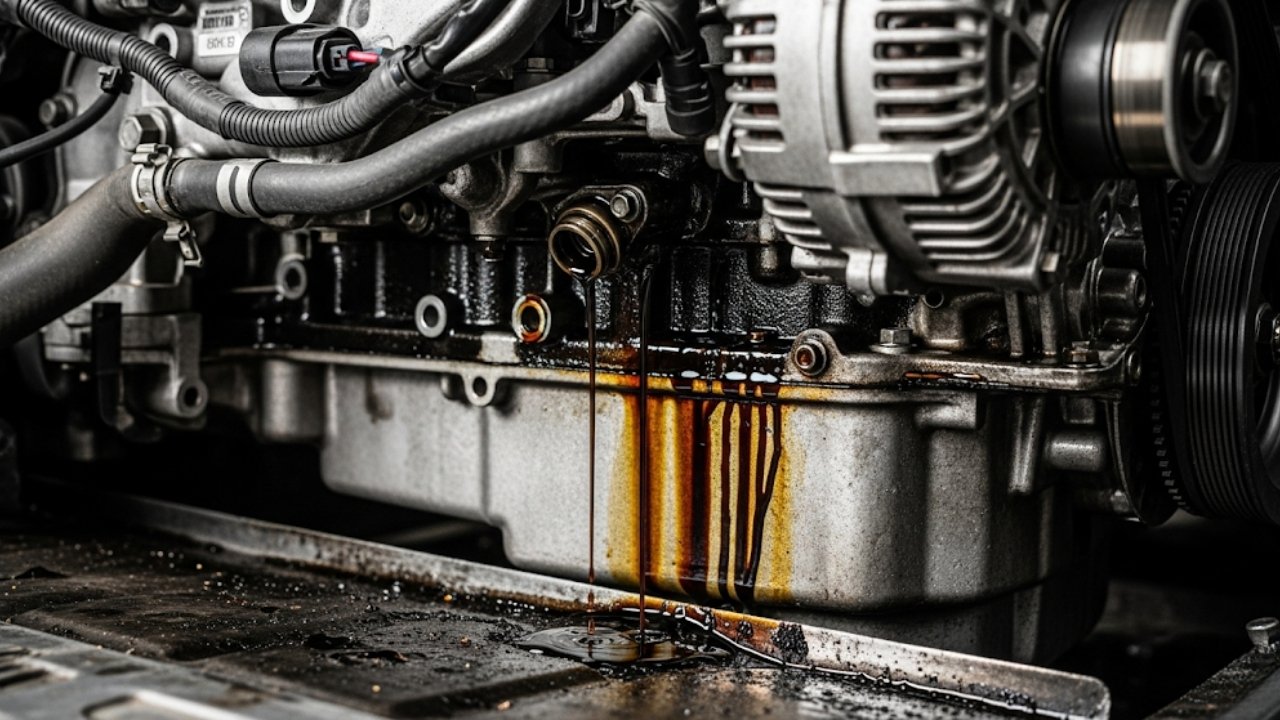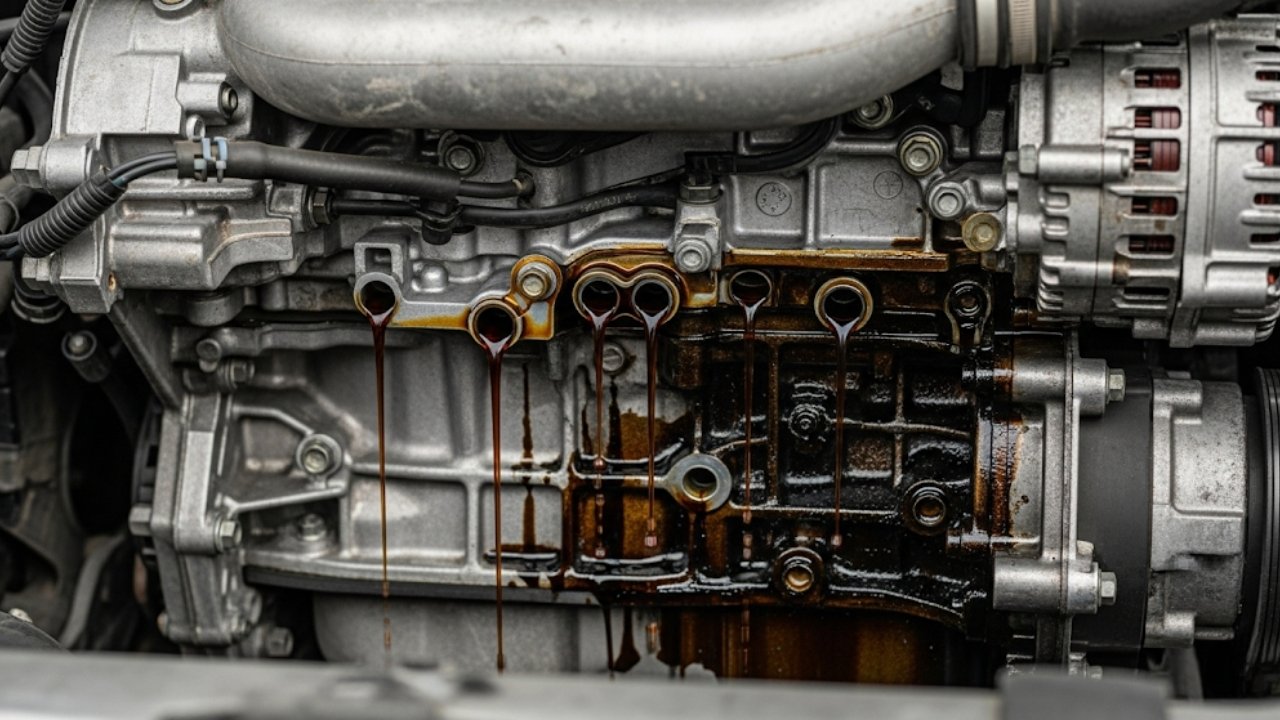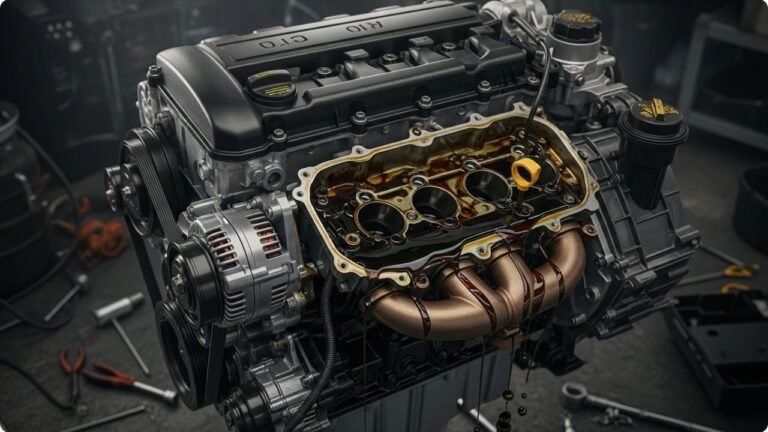Why is My Car Engine Oil Leaking? A Complete Guide

Have you ever walked out to your car, only to find a dark puddle under the engine? That dreaded stain on your driveway isn’t just an eyesore—it’s a warning. Car engine oil leaking might seem like a minor nuisance at first, but trust me, it can snowball into a nightmare if ignored. It’s like finding water in your ceiling; you know there’s more damage hiding behind the scenes.
Many drivers, especially new ones, panic when they see oil on the ground. But don’t worry—we’ve all been there. I remember my old Honda Civic dripping oil like a leaky faucet. I kept topping up oil every few days until the engine started knocking. That mistake cost me a fortune. So, let’s dig into what causes engine oil leaks, how to detect them early, and what you can do to stop the mess before it gets expensive.
In This Article
- 1 What Causes Car Engine Oil Leaks?
- 2 Signs Your Engine is Leaking Oil
- 3 Table: Common Leak Locations and Symptoms
- 4 Dangers of Ignoring an Engine Oil Leak
- 5 DIY Inspection: How to Find the Source of the Leak
- 6 How to Fix Car Engine Oil Leaks (With or Without a Mechanic)
- 7 The Cost of Fixing a Car Engine Oil Leak
- 8 Preventing Oil Leaks: A Long-Term Strategy
- 9 Real-World Scenarios: When and Why Oil Leaks Happen
- 10 The Emotional Cost: More Than Just a Repair Bill
- 11 Frequently Asked Questions (FAQs)
- 11.1 1. Is it safe to drive with an engine oil leak?
- 11.2 2. Can I fix an oil leak myself?
- 11.3 3. How can I tell if the leak is oil or another fluid?
- 11.4 4. Will stop-leak additives damage my engine?
- 11.5 5. How often should I check for leaks?
- 11.6 6. Can synthetic oil cause leaks?
- 11.7 7. What’s the most expensive oil leak to fix?
- 11.8 8. Can an oil leak cause a fire?
- 12 Bullet Summary: What You Need to Remember
- 13 Cultural Insight: Why This Matters Globally
- 14 Metaphors That Stick: Oil is Like Blood
- 15 Final Thoughts: Keep Your Car and Peace of Mind in Gear
What Causes Car Engine Oil Leaks?

Common Causes of Engine Oil Leaks:
-
Worn out gaskets and seals
-
Damaged oil pan
-
Loose or damaged drain plug
-
Cracked valve cover
-
Oil filter issues
-
PCV system failure
-
Improper installation of parts
Real-life story:
My friend once replaced his oil filter during a DIY oil change. Turns out, the old rubber gasket stuck to the engine, and he installed the new filter on top of it. Within minutes of driving, oil sprayed all over the engine bay. Moral of the story? Even small oversights can cause big leaks.
Signs Your Engine is Leaking Oil
Spotting the leak early can prevent engine damage. Here’s what to look for:
Visual Signs:
-
Oil puddles or spots under the car.
-
Greasy buildup on the engine block.
-
Blue or gray smoke from the exhaust.
Performance Signs:
-
Burning oil smell inside the car.
-
Sudden drop in oil level.
-
Engine running rough or overheating.
Pro Tip: Keep a close eye on your oil dipstick. If the level keeps dropping, there’s a leak somewhere.
Table: Common Leak Locations and Symptoms
| Leak Location | Common Symptoms | Severity |
|---|---|---|
| Oil Pan Gasket | Puddle under the engine | Medium |
| Valve Cover Gasket | Oil on top of the engine | Medium |
| Oil Filter | Oil spray near the filter area | High |
| Rear Main Seal | Oil near transmission bell housing | Severe |
| Drain Plug | Drips after oil change | Low (if tightened) |
| Timing Cover | Oil on timing belt or serpentine belt | High |
Dangers of Ignoring an Engine Oil Leak
I get it—life’s busy. But putting off a car engine oil leaking issue can lead to major headaches. Think of it like a small tooth cavity. Left untreated, it becomes a root canal.
Here’s what can go wrong:
-
Engine overheating due to lack of lubrication.
-
Internal engine damage—bearings, pistons, and cams get destroyed.
-
Fire risk—oil on hot surfaces can ignite.
-
Pollution—leaked oil can contaminate water and soil.
Even a slow leak can dry out your oil levels over time, leading to engine seizure. Once that happens, it’s either a full engine rebuild or shopping for a new car.
DIY Inspection: How to Find the Source of the Leak
Sometimes, you can find the leak yourself with a few simple tricks. No need to be a mechanic—just a curious car owner.
Step-by-step guide:
-
Start with a clean engine. Wipe it down with degreaser.
-
Check the oil filter and drain plug. Are they tight?
-
Inspect the oil pan and gasket. Look for fresh oil trails.
-
Shine a flashlight around valve covers. You might spot seepage.
-
Use UV dye. Add it to your oil and use a UV light to trace the leak.
Personal tip: Use old cardboard under your car at night. The next morning, the oil pattern on the cardboard will tell you where it’s coming from.
How to Fix Car Engine Oil Leaks (With or Without a Mechanic)
Fixing an oil leak depends on where it’s coming from. Some repairs are DIY-friendly, while others need a pro.
Easy Fixes (Do-It-Yourself):
-
Tighten the oil drain plug or replace the crush washer.
-
Replace the oil filter and make sure the old gasket isn’t stuck.
-
Add oil stop-leak additives (temporary fix for minor leaks).
-
Swap out valve cover gaskets with a few tools and patience.
️ Professional Repairs:
-
Rear main seal replacement (engine removal needed).
-
Oil pan gasket (labor-intensive if parts need disassembly).
-
Timing cover reseal (often a full-day job).
Important: Don’t rely on stop-leak products long term. They’re like band-aids, not surgery.
The Cost of Fixing a Car Engine Oil Leak
The cost varies wildly. Here’s a breakdown:
| Leak Type | DIY Cost | Professional Cost |
|---|---|---|
| Oil Filter / Drain Plug | $5 – $30 | $50 – $100 |
| Valve Cover Gasket | $20 – $40 | $100 – $250 |
| Oil Pan Gasket | $25 – $50 | $200 – $500 |
| Rear Main Seal | Not recommended | $600 – $1,200 |
| Timing Cover Gasket | Not recommended | $400 – $900 |
Sometimes, it’s not about the parts but the labor time. Mechanics charge hourly, and hard-to-reach leaks cost more to fix.
Preventing Oil Leaks: A Long-Term Strategy
An ounce of prevention really is worth a pound of cure when it comes to oil leaks. Here’s what I do (and you should too):
-
Change oil on time and use the right type.
-
Don’t overtighten the oil filter or drain bolt.
-
Inspect gaskets regularly, especially on older cars.
-
Check oil levels weekly.
-
Use high-quality engine oil to reduce gasket wear.
Think of your car like your body—catching small symptoms early can prevent major health issues down the road.
Real-World Scenarios: When and Why Oil Leaks Happen
Imagine this—you’re on a road trip with friends, vibing to your favorite playlist, and suddenly the engine light blinks on. You stop, pop the hood, and there it is: smoke, the smell of burning oil, and a light drizzle of fluid around the valve cover. You’re stuck on the highway, and your perfect weekend just turned into a tow truck call.
These moments are more common than you think. Here are a few relatable scenarios where oil leaks catch people off guard:
-
Post-oil change mishaps: A rushed or inexperienced mechanic may forget to tighten a bolt or damage a gasket.
-
Cold weather cracks: Sudden freezing temperatures can cause older seals to shrink or crack.
-
High-mileage cars: Gaskets and seals wear out over time, especially after 100,000+ miles.
-
Modified engines: If you’ve added a turbo or performance parts, your engine might be under more stress than usual.
Lesson? Never ignore even a small oil drip. That little drop is often a symptom of something bigger brewing inside.
The Emotional Cost: More Than Just a Repair Bill
Let’s talk honestly. Yes, car engine oil leaking is a mechanical issue. But there’s a mental and emotional side to it too.
Your car isn’t just metal and wires—it’s your freedom. It’s the weekend getaways, late-night drives, and emergency runs to the store. When something goes wrong, it creates stress, uncertainty, and often, financial worry.
I remember missing a job interview because my car stalled from low oil pressure. It was one of those “if only I had…” moments. If only I had checked the oil a week earlier. If only I had listened to that ticking sound.
That’s why spotting and fixing leaks early matters. You’re not just saving your engine. You’re protecting your lifestyle.
Frequently Asked Questions (FAQs)
1. Is it safe to drive with an engine oil leak?
Short answer: No, not for long.
Even small leaks can lead to oil starvation. If the engine runs without enough oil, it can overheat or seize.
2. Can I fix an oil leak myself?
Yes, for minor issues like replacing the valve cover gasket or oil filter. But deep leaks like the rear main seal usually require a professional.
3. How can I tell if the leak is oil or another fluid?
Oil is usually dark brown or amber and slick. Transmission fluid is reddish, and coolant is often green or pink. Smell and color help identify the leak.
4. Will stop-leak additives damage my engine?
They’re okay for temporary fixes on small leaks, but not a permanent solution. Overuse can clog oil passages.
5. How often should I check for leaks?
Ideally, glance under the car weekly and check oil levels every 2 weeks or before a long drive.
6. Can synthetic oil cause leaks?
Not directly. However, synthetic oil flows better and can escape through old gaskets that were holding up with thicker conventional oil.
7. What’s the most expensive oil leak to fix?
The rear main seal. It requires the engine or transmission to be removed—labor-heavy and costly.
8. Can an oil leak cause a fire?
Yes. If oil sprays onto a hot exhaust manifold or turbo, it can ignite. Rare, but dangerous.
Bullet Summary: What You Need to Remember
-
Oil leaks are common, especially in older or high-mileage cars.
-
Small leaks can cause big problems if ignored.
-
Check your oil regularly and never assume a leak will “go away.”
-
Use quality oil and parts for maintenance.
-
When in doubt, consult a mechanic—especially for deep internal leaks.
-
Don’t underestimate the emotional stress a leaking engine can cause.
Cultural Insight: Why This Matters Globally
In many parts of the world—South Asia, the Middle East, Eastern Europe—people depend heavily on their cars as lifelines. In rural areas, a car is more than convenience—it’s access to hospitals, jobs, and family. A leaking engine, for someone on a tight budget, can mean weeks without transport.
That’s why preventive care matters. In places where roadside help isn’t always a call away, knowing how to inspect and respond to an oil leak can be the difference between safety and a breakdown in the middle of nowhere.
Metaphors That Stick: Oil is Like Blood
Think of engine oil as the lifeblood of your car. Just like your body needs clean, circulating blood, your engine needs clean, circulating oil. If blood leaks from your body, you’d see a doctor immediately. So, when your car starts leaking oil? Don’t wait.
It’s not just about metal-on-metal damage. It’s about keeping the entire system healthy—efficient, smooth, and reliable.
Final Thoughts: Keep Your Car and Peace of Mind in Gear
In the end, car engine oil leaking may start as a few drops—but it speaks volumes. It tells you your car needs attention, care, and maintenance. Ignore it, and you risk losing more than oil—you risk time, money, and peace of mind.
Let’s be real: no one wants surprise expenses or breakdowns. But being proactive, even just by checking your driveway or listening for strange sounds, puts you ahead of the curve.
So next time you spot a drop, don’t panic. Now, you know exactly what to do.






